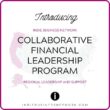Avoid These Undesirable Business Personality Types
In my work coaching Indie Business owners, I have seen a lot of people make a lot of mistakes. I've made many mistakes myself, so I'm especially good at helping my clients avoid the pitfalls that can quickly destroy their business.
At one time or another, I have been all of the business people I don't want to be, and made all of the business mistakes I don't want to make. To help you lead your business effectively, this post offers tips to help you avoid 3 destructive business personality types and the mistakes they make.
1. Holly Hobbyist
Holly Hobbyist is creative and fun. She is naturally gifted and talented and is the person you call when you need to add some flair to your life. If Holly is your friend, you are never without a personal fashion consultant or interior designer. Throughout her life, Holly has enjoyed all kinds of hobbies. One day, she realizes that so many people ask her for help that she could start charging a fee. So that's what she does.
Holly knows that her services are every bit as good as the people that command a high fee, but because she's a "hobbyist," Holly feels guilty when she charges what "professionals" charge. Holly decides that, if she charges less than she's worth, she can make it up on volume. So she prints up brochures, sets up a website and in about 24 hours, she's in business. Within a few months, she realizes that she's working harder than her competitors and for less money. She enjoys her work, but she knows she'd enjoy it more if she charged what she is worth. But now, she's stuck into a pricing structure that people have come to expect and she fears that raising her prices will send prospects running in the opposite direction.
- Avoiding being Holly Hobbyist begins with adopting a business mindset. This means abandoning any sense of guilt that you are now charging for something that you once gave away for free. To make sure this mindset stays with you, join at least one business networking group or local chamber of commerce and then use the benefits and participate. Surrounding yourself with other business people will help you take yourself more seriously.
- Charge what your products and services are worth from the very beginning. Research what others charge for similar products and services, assess what is fair in your particular case (considering things like educational level, experience or quality) and charge what covers your costs (all of them) plus a reasonable amount to make a fair profit that not only keeps you in business but also pays you. (You may not be able to write yourself a weekly check at first, but that should absolutely be one of your first goals.)
2. Credit Card Candace
Credit Card Candace is excited and confident that it won't take her very long to get her new venture off the ground. She may or may not have money of her own, but that doesn't matter because she's got credit cards. Her business planning is sketchy because her credit will make up for any unanticipated events. Candace charges this and that here and there, and before she knows it, she's run up a balance that has fees she didn't expect. To compound the problem, she makes one late payment. In response, the bank increases her interest rate and imposes a $35 late fee.
Candace can cover the late fee and continue to make payments that leave enough room at the top to cover her continued need for supplies. But over time, the credit card balance hanging over her head begins to take a mental toll. She loves what she does all day, but at night, she has trouble sleeping because the burden of overextending herself is so heavy.
- Avoiding being Credit Card Candace by adopting a frugal mindset. And I don't just mean frugal, I mean cheapskate frugal. I saved $2.50 on cold medicine last night using a coupon. $2.50 is not going to change my business or my household much, but if I save $2.50 on every item I buy for my home and business, I'm saving thousands of dollars a year. (More couponing and rebate tips here and in a video here.)
- Pinch every penny, and I mean that literally. Save money each week so that you can cover at least part of your costs in cash. Assess whether you really need what you are about to charge on a credit card or whether you can get the same thing later, or barter for it. The bank may be extending you credit, but they don't have to be in control of that credit. You do. Pay your credit cards, not according to the bank's schedule, but according to your schedule. Use online payment systems to make a payment at least once a week. Don't wait until the end of the month to pay if the balance is accumulating.
3. DIY Guy
DIY Guy is very smart. He's a lone ranger and has done so well in traditional careers that he has seldom needed to reach out for help. He approaches each project with gusto and vigor and maintains as much control as possible. After all, no one can do anything quite like him. Guy has great products, so he's confident that the money he's saving by doing everything himself will allow him to compete more effectively.
Rather than hire a website designer or buy an inexpensive template, Guy reads "dummy" books and codes his site himself. He takes his own product photos, writes his own copy, creates his own logo and site banner and sends buyers to PayPal. While there's nothing wrong with Guy doing some things himself to save money, doing all of them makes his new website look amateurish and uninviting. And of course, he wonders why he's not making much money.
- You may be able to do it all in a traditional job, but when you're Indie, you can't do everything yourself. For one thing, you'll find yourself working so much in your business that you won't be working onit. Working in your business means spending all day in the minutiae and never assessing the big picture. Guy is so busy learning HTML code and figuring out how to take product photos that he forgets all about making a profit doing what he's really good at.
- Don't be so busy doing everything yourself that you don't have time to sell anything. A business can recover from a lot of things. Failure to sell anything is not one of them.
It's tough to launch, own and manage a business of your own, but once you decide to pursue your dreams, you must shed old mentalities that don't work in the business world.
Holly, take yourself seriously.
Candace, get a grip on your finances.
Guy, learn to delegate.
What do you think?
When I look back through the years, I see a little of myself in Holly, Candace and Guy. But the only reason I'm still in business today is because I replaced those personalities with ones that empowered me to become profitable and enjoy my life at the same time. Do you see yourself here? What are your questions or comments on this topic? If you have overcome Holly-itis, Candace-itis or Guy-itis, use the comment section to share your tips and suggestions so others can follow in your footsteps.
Related Posts
3 Hot Tips to Kick Start Your Business
Survival of the Fittest
You Have to Touch Home Plate
For more success tips, subscribe to Indie Business Blog today.
If you like Indie Business Blog, please share the home page with your friends using this link: http://tinyurl.com/6l5h79.



